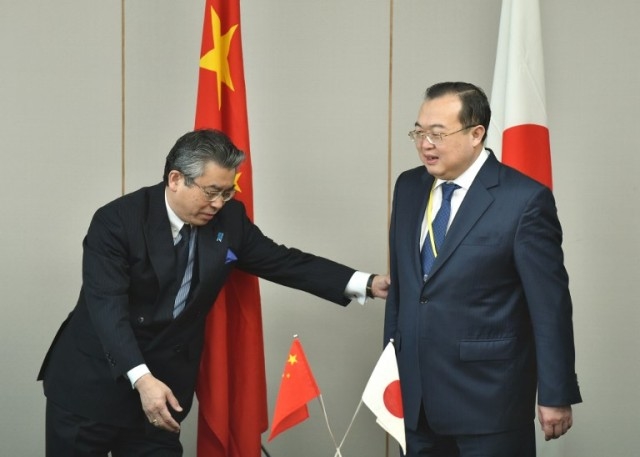Foreign and defense officials from China and Japan kicked off a high-level security meeting in Tokyo on Thursday, the first one between the two sides in more than four years.
The delegations were set to discuss a range of defense-related issues including maritime liaison mechanisms to avoid accidental incidents at sea.
Liu Jianchao, China’s assistant foreign minister, told the meeting that international security situation has changed dramatically in the four years and the situation around China and Japan is also getting more sophisticated during the period.
It is important to keep dialogue between the two countries’ foreign and defense ministries as the two sides are important neighbors and regional powers, adding the meeting is also of significance to maintain regional peace, he said.
The Chinese diplomat also called for a sincere and pragmatic attitude so as to improve the talks and their cooperation.
The countries agreed to keep alive and foster a nascent recovery in bilateral ties plagued by the legacy of Japan’s wartime aggression and a territorial dispute. The world’s second- and third-largest economies, however, failed to set a timetable for the implementation of a scheme designed to ensure real-time communication between their armed forces.
China-Japan relations witnessed a turning point last year with the signing of a four-point agreement, adding Beijing hopes to develop ties with Tokyo in the spirit of “taking history as a mirror and looking forward to the future,” Liu said.
CCTV talks to Bonnie Glasser about the Japan- China talks
CCTV talks to Bonnie Glaser about the significance of these talks and how will they impact relations between China and Japan. Bonnie Glaser, from the Center for Strategic and International Studies here in Washington is a senior advisor for Asia and the Freeman Chair in China studies.

Sino-Japanese relations have chilled over what China views as Japan’s reluctance to properly atone for its wartime past as well as a dispute over a group of tiny East China Sea islets. Patrol ships and fighter jets from both countries have shadowed each other regularly near the uninhabited islands that are controlled by Japan but also claimed by China, prompting fears that an accidental collision could spark conflict.
Japanese Prime Minister Shinzo Abe’s moves to ease the constraints of Japan’s pacifist constitution on its military have unnerved China. Japan says China’s defense policy lacks transparency.
Abe held formal talks with Chinese President Xi Jinping last November. In the meeting, hailed by Xi as the first step toward improved ties, the two agreed to work for the implementation of a bilateral crisis management mechanism.
Japanese Deputy Foreign Minister Shinsuke Sugiyama said Japan- China ties gradually improved since last year as the two sides agreed to establish air and maritime emergency contact mechanism and high-level negotiations over maritime issue. The two sides should talk directly so as to resolve problems existing in their ties and carry out relevant cooperation through talks, he noted.
“Both sides agreed that the tide is beginning to turn for the better regarding relations between Japan and China following the summit meeting,” a Japanese Foreign Ministry official told a media briefing after the one-day meeting.
“They also agreed that it is important to keep on taking positive steps in various areas and at various levels to firmly establish this trend.”
Senior officials from both sides’ defense ministries also took part in the meeting.
The talks, launched in 1993, were last held in Beijing in January 2011 but were suspended due to Japan’s unilateral move to “nationalize” China’s Diaoyu Islands. China-Japan ties are frayed due to the territorial dispute as well as historical issues.
In a sign of a thaw in Sino-Japanese ties, foreign ministers of Japan, China and South Korea are set to meet on Saturday in Seoul for the first time in nearly three years.
Xi and Abe, in their talks last year, agreed to aim for implementation of a plan for hot lines between defense officials as well as communication between vessels and aircraft to convey each other’s intentions and avoid clashes.
Although both sides at the Thursday meeting agreed to work to implement the scheme at an early date, no agreement was reached on a concrete schedule toward that goal, the official said.
Story compiled with information from Xinhua News, Reuters, and The Associated Press.
 CGTN America
CGTN America Japan’s Foreign Deputy Minister Shinsuke Sugiyama (L) gestures as he welcomes China’s Assistant Minister of Foreign Affairs Liu Jianchao (R) prior to the 13th round of Japan-China Security Dialogue at the Foreign Ministry in Tokyo on March 19, 2015. At the dialogue, the two sides will exchange view on both countries’ security and defence politics and regional issues. AFP PHOTO / KAZUHIRO NOGI
Japan’s Foreign Deputy Minister Shinsuke Sugiyama (L) gestures as he welcomes China’s Assistant Minister of Foreign Affairs Liu Jianchao (R) prior to the 13th round of Japan-China Security Dialogue at the Foreign Ministry in Tokyo on March 19, 2015. At the dialogue, the two sides will exchange view on both countries’ security and defence politics and regional issues. AFP PHOTO / KAZUHIRO NOGI
